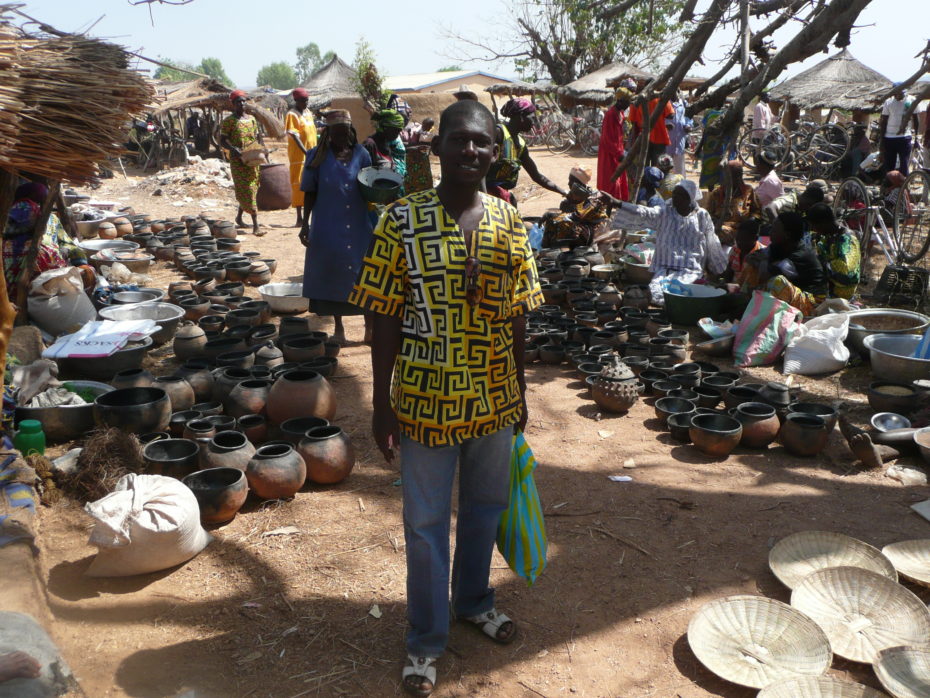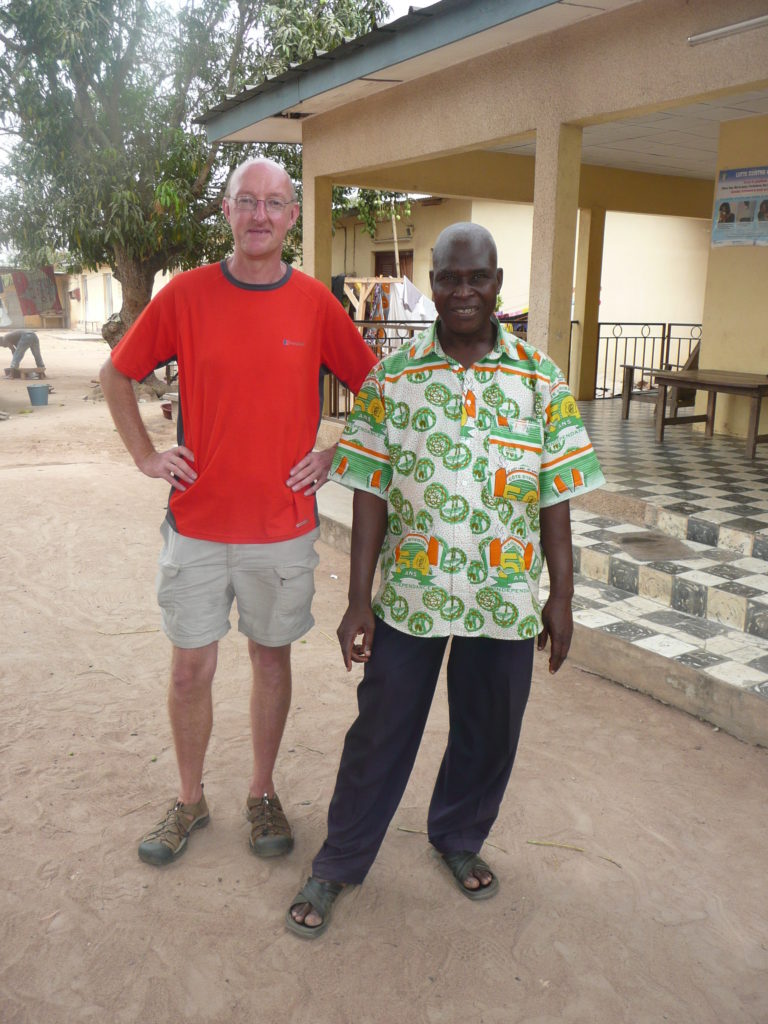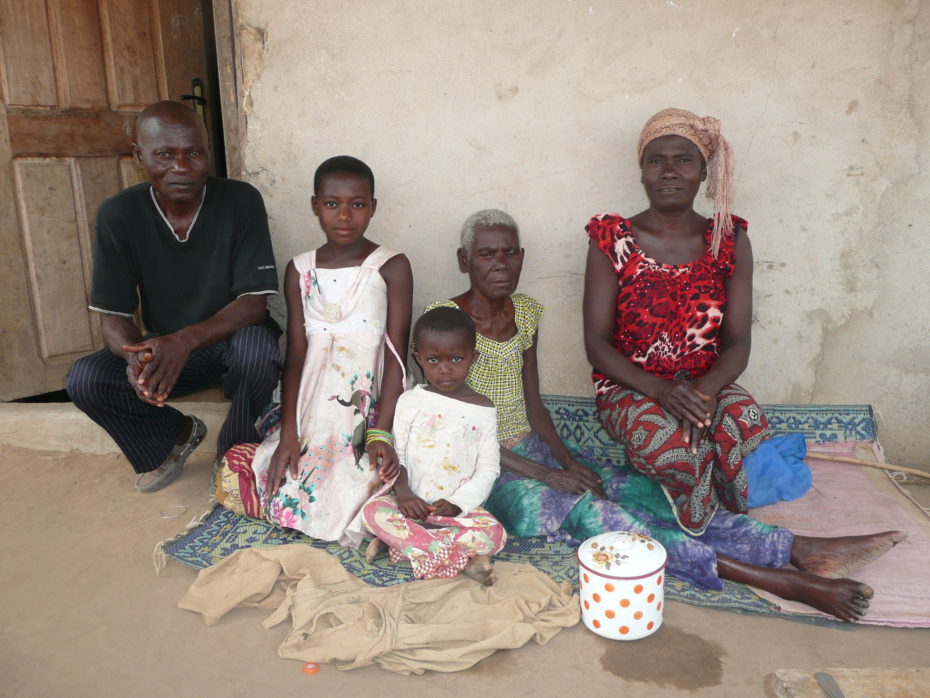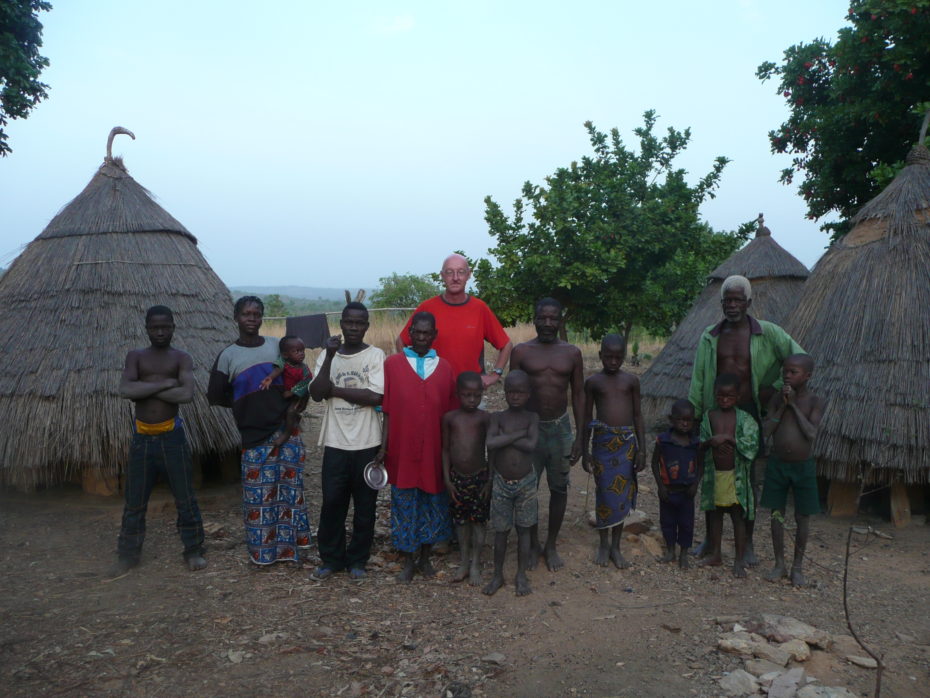At a café in a small town in Northern Benin, a young man asked if it was ok to share my table and I had to assure the waitress that I was only too happy to chat to a stranger who she assumed would only bother me. He introduced himself as Paulin and we spent a few hours discussing life, the universe and everything. It’s always rewarding to find someone interested and knowledgeable in African politics to get a better understanding of the continent. As I was going to be in the village where he worked in a couple of days we agreed to meet up.
The village of Boukoumbe is next to the border with Togo and sufficiently remote to mean that only a narrow dirt track joins the two countries and finding passport control entails a further hour’s bumpy and dusty motorbike ride over a slightly wider track to get to anything resembling a police station. Thus, we could take the opportunity of going abroad for a beer in the evening. Over these beers we discussed numerous subjects and I certainly didn’t expect to be talking about Prime minister David Cameron’s veto at the EU with anyone in a quiet corner of West Africa.
Although his father was from nearby in Benin, his mother was from Cote d’Ivoire but he, with his brother and sister had been brought back from there at the age of 12 when his father became ill and subsequently died. Not having seen or heard of his mother since, he wanted to trace her but didn’t have the means to get to Cote d’Ivoire for a prolonged stay. As he knew the name of her home town and I knew I could get there, I said I would do what I could.
So, a few weeks and over 1500km later in the small town of Toumodi armed with a big pile of photocopied adverts I set about the task of posting them up everywhere. Given that the insignificant town has no reason to attract tourists, the sight of the funny white man putting up posters attracted a huge amount of interest and over 3 days I ended up talking to hundreds of people, many of whom went out of their way to assist. Their interest and support was a real boost to my faith in humanity. I still hadn’t much faith in it working as so many people said that without the name of the mother’s birth village it would be difficult, so after some enquiries with his brother and sister Paulin came up with a likely name. As his mother was from the Baoule tribe I had already met Felix, the local tribal chief, a big friendly man with a taste in the kind of loud shirts that only Africans can get away with. The next day he was happy to come with me to the most likely village of that name, there being several so named in the region but little seemed certain.
We arrived to find the village chief in session and Felix embarked upon the traditional greetings, a long series of exchanges, which regardless of the tribal language rattle along with the clicikity clack rhythm of a train. This usually means that you have to ask after each other’s family members, daily affairs and for all I know the livestock as well. He explained why we were there and the group of a dozen men looked at each other questioningly and I started to have my doubts, until one explained he was Paulin’s uncle but talked, mostly in Baoule, in such a subdued manner that I was still dubious . With a few names and words in French I realised he was talking about Paulin’s childhood so I began to think there was a concrete link and had made some progress. I was completely taken aback when he switches to French to explain that a priest he knows in Toumodi had seen my posters and phoned him last night so had put Paulin and his mother, now in Abidjan, in contact. I’d actually done it!
After three days in town I was starting to think the posters were a lost cause and that following up the village trail was only vague hope, but both had worked. Then and several times as I was taken to meet the rest of the family, including his ancient grandmother, I have to admit that I struggled to overcome the emotion, with the urge to burst into tears, but good old British reserve saw me through. I had brought a photo of Paulin with me to show them and took pictures to take back to him. Whilst mobile phones with cameras have become relatively common, actual photos are beyond the means of most people, particularly in rural areas so are always appreciated.
I was enveloped in a hazy emotion combining elation and simultaneously, being rather dumbfounded but the important thing was that I had done something decent for a family, only one of whom I knew and then only slightly. It’s easy to dish out coins to the needy but when travelling you don’t often get a real opportunity to pay back people’s kindness in a really meaningful way. Besides, the process was a lot more enjoyable than sitting on a beach for a few days.
My return route to Benin took me back to where we met in the first place, so Paulin and I spent a few days hanging out and had the chance of visiting his adoptive parents from his father’s family. Their village was at the end of a long dirt track, off another dirt track and couldn’t imagine that any tourist had been down this way for a long time, a fact confirmed when I was introduced to the first small child who looked at me in terror, never having seen a white person before. The village was composed of traditional mud homes and if the few corrugated iron sheets were taken away it could be anytime in the last 500 years. We relied on moonlight at night as there were no generators and it seemed the village could only rustle up a couple of torches between them.
Profuse welcomes came from the family, involving forms of bows and curtseys, denoting a measure of respect for strangers little know in Western Europe, though Paulin had to translate as no one spoke French. We checked out the night market under a big mango tree, which, as I have discovered with all rural markets, have little to do with buying and selling stuff as the primary purpose is to get trashed on tchouk, the local millet beer, which, despite tasting like a cross between home brew and dishwater I have started developing a taste for. The atmosphere was friendly and enchanting, even though few spoke French I had several amusing exchanges. I had to ask for a translator when an old man started talking to me, the translator listened attentively for a while, nodding occasionally, turned to me and said, “Oh ignore him he’s pissed” (that’s drunk for the US readers). I was plied with booze by the beer woman, as well as getting a bowl of food and ended up somewhat slaughtered. Marriage was definitely discussed but I don’t think I made any firm commitments. Having bought drinks for ourselves and several other people I discovered that I had spent the princely sum of £1.
With home less than a week away and experiences such as this becoming the norm I knew going back would be a new level of weirdness. We ate some delicious, unknown wild fowl back at the parent’s place and slept under the stars in the yard.
As we had to leave early in the morning for Paulin to get back to work the family said sorry I couldn’t stay to eat so I am given some Guinea Fowl eggs and a chicken to take home with me – a very much alive version rather than the prepared and packaged item we are used to. It spends its last unhappy hours on earth, as many do here, hanging from the motorbike handlebars to be taken to its place of execution. Thankfully someone is found to do all the grisly stuff and it’s served up for supper later.








